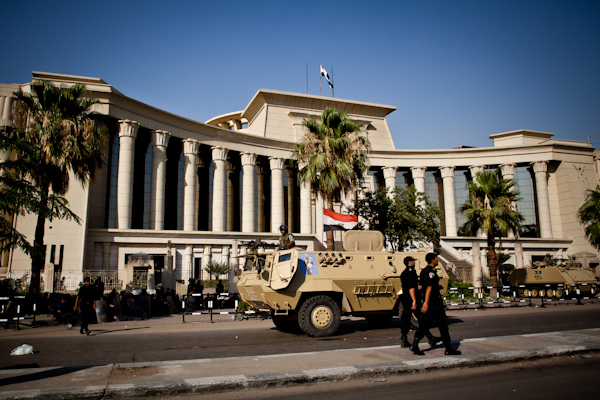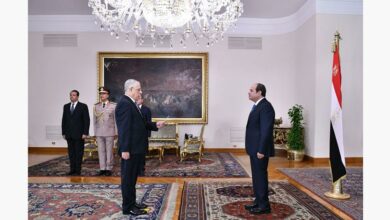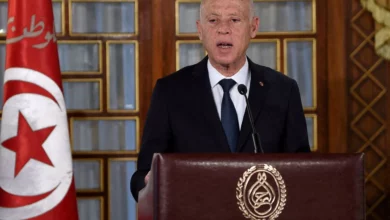
The acquittal of all defendants in the Battle of the Camel case, and President Mohamed Morsy’s subsequent sacking of the public prosecutor, are the most recent examples of the politicization of the judiciary, observers say.
Twenty-four defendants, including pillars of the Mubarak regime such as former Parliament speaker Fathi Sorour and former Shura Council speaker Safwat al-Sherif, were acquitted on Wednesday of charges relating to inciting an attack on protesters on 2 February 2011. The incident, known as the Battle of the Camel, was initiated by men on horses and camels and escalated into the use of firearms and the appearance of snipers, leading to dozens of deaths and injuries in the midst of the 25 January revolution.
Morsy promptly responded to the public outcry against Wednesday’s verdict by removing Public Prosecutor Abdel Meguid Mahmoud from his position and appointing him ambassador to the Vatican. The latter insisted he would keep his job, claiming that Morsy did not have the legal right to remove him.
The case prompted speculation from observers about the political motivations behind Morsy’s decision to fire the prosecutor, and how a failed justice system has allowed the rights of those killed during the revolution to fall through the cracks.
Mohamed Naeim, a member of the political bureau of the Social Democratic Party, says that firing the public prosecutor now, when people have been demanding his ouster for over a year, is a continuation of the Brotherhood’s policy of making symbolic concessions to appease the public following unsatisfactory or politically embarrassing events.
Morsy’s decision could also be seen as a way to turn what looks like a judicial failure into a political gain.
“The demand to remove the public prosecutor has been there for months, but they were keeping him to play this card when they needed to,” says Naeim.
A political tactic
Mahmoud was close to the Mubarak regime, and has been accused of taking a soft approach to corruption cases when trying figures from the former president’s era. After the election of a Muslim Brotherhood member to the helm of the state, the office of the public prosecutor has been seen as a surviving relic of the old regime.
While some political figures welcomed Mahmoud’s removal as a revolutionary move, judicial figures have criticized Morsy’s decision as an attack on the independence of the judiciary and a breach of judicial immunity.
Judge Zakareya Shalash, head of the Court of Cassation, called the decision an unconstitutional “massacre of the judiciary” in a phone interview with satellite TV channel Al Jazeera.
Others interpret the move as an attempt by the Morsy administration to tap a Brotherhood-friendly candidate to the position.
“It seems that this is a plot to choose a specific public prosecutor … whose loyalty is to the ruling party,” Shalash said.
Morsy has already appointed judges known for their affiliation to the Brotherhood to senior judicial posts, including the current minister of justice, a leading proponent of the independent judiciary movement.
There have been numerous calls to take away the president’s power to name the public prosecutor. Current Justice Minister Ahmed Mekky has proposed a draft law to that effect, stating that the Supreme Judicial Council should be in charge of the appointment instead.
A failed case
Lawyers say that the prosecution’s failure to build a strong case against the defendants in the Battle of the Camel case was the primary reason for the verdict, with some blaming the Morsy administration for lacking the political will to secure justice for the martyrs of the revolution.
Some have called the decision to fire Mahmoud at this point in time an attempt by the president to avoid taking blame for the acquittals.
“Those who died have no one on their side in the ruling spheres. Some members of the Brotherhood may be angry at the ruling, but they should have done something earlier,” says Naeim.
Brotherhood figures were quick to voice their disappointment in the verdict and laid the blame on the military council, which was ruling at the time the investigations started.
Aly Atef, a lawyer representing the families of the victims in the case, says that he has lost hope that justice for the martyrs of the revolution can be reached through the judiciary.
While Atef says that he doesn’t blame the judge, he claims that the prosecution's case was seriously flawed.
“The prosecution and the investigation judges are the reason for the collapse of this case. They took on the role of the defense in this case,” says Atef.
Atef says that when he reviewed the case after it had been referred to the court, it was clear that serious mistakes and oversights committed by the prosecution during the investigation wasted critical evidence, and would lead to the acquittal of the defendants.
The judge presiding over the case said that the court found the witnesses’ accounts unreliable, as they were mostly second hand. The court therefore decided to base its ruling on the testimony of Hassan al-Roweiny, former commander of Egypt’s central military zone, who testified that no bodies or weapons were found in his jurisdiction on the day in question.
When asked how evidence was not found for an attack that had thousands of eyewitnesses, and which was followed by millions more on television, Atef says that the prosecution simply didn’t seek out the first hand testimony needed to win the case.
Atef says that those indicted for carrying out the attacks were not summoned to testify in the case to confirm that they have received orders from the accused.
He also claims that the prosecution neglected important steps in the investigations, such as visiting the scene of the attack, taking the testimonies of those living nearby and obtaining a record of the phone calls of the accused before the incident, which could have included a record of them planning the attack.
By neglecting to obtain this evidence, the prosecution was left with only second hand accounts and video footage that didn’t show any killings, and that didn’t serve to tie the events to the accused, Atef says.
Additionally, Atef says that the long trial period, which lasted from September 2011 to October 2012, gave the defendants an opportunity to influence the witnesses who had been called to testify, many of whom changed their testimonies in court. Their testimonies were therefore deemed unreliable.
Wednesday’s acquittals are the latest in a series of verdicts favoring former Mubarak officials who were accused of killing protesters, including former Interior Minister Habib al-Adly’s aides who were released in June. In these cases, the public prosecutor and investigative authorities were also blamed for failing to do due diligence.
Gamal Eid, head of the Arabic Network for Human Rights Information, says that the prosecutor’s mistakes were allowed by the political leadership, which has not proven a commitment to seeking justice in these cases.
“I think that political factors have infiltrated all these cases [of killing protesters]. It doesn’t mean that the papers of the case were manipulated, but the lack of the political will to punish the killers of protesters is what allowed the mistakes of investigations,” says Eid.




